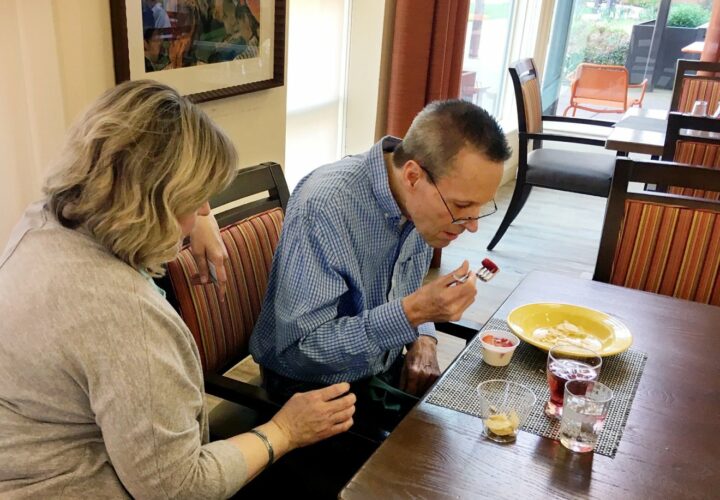Dr. Erin Zahradnik, who provides palliative care for people living with dementia, offers guidance for new caregivers.
A dementia diagnosis may upend life plans for both the person with the diagnosis and their family. Dr. Erin Zahradnik, who provides palliative care for people living with dementia, offers a few pieces of wisdom for those who are learning to be caregivers, which include:
- The importance of discussing practical matters, such as power of attorney, health care decisions, and end-of-life desires and choices;
- How to cope with outbursts or episodes of paranoia;
- The importance of finding support early on, whether that is joining a virtual support group, or reading books about caregiving and dementia.
Being Patient spoke with Dr. Erin Zahradnik about palliative care and improving caregiver interactions and what resources are available to families after a dementia diagnosis.
Being Patient: How do you define palliative care?
Dr. Erin Zahradnik: Palliative care is the umbrella term for symptomatic management of patients who have any sort of serious illness. It doesn’t have to be a terminal illness, it could be a curable cancer or it could be something that has no cure like dementia.
It varies as to what it includes but essentially it’s support of the patient and of the family. It can be medication support. It could be psychological support. It could just be someone to help you make decisions if you’re going through a serious illness.
Being Patient: What are some of the issues at the early stage of dementia we need to pay attention to in order to get a plan in place?
Dr. Erin Zahradnik: The biggest thing is probably thinking about practical matters like who is your power of attorney or your health care decision maker, and do you have that in place? Do you have the paperwork? Have you talked to the person and let them know that they are in fact your power of attorney and have you discussed end-of-life decisions?
This can be really important to do early on when the patient has more awareness and is able to make their own decisions and explain what’s going on, and to engage in conversations with family members. A lot of times, people are really reluctant to do this, especially with dementia because we don’t think about dementia necessarily as a terminal illness. It’s like a memory problem, but it really is a terminal illness.
Being Patient: People with dementia often experience confusion and paranoia. What’s the strategy that we as caregivers should employ to avert a crisis in an instance when our loved one is having an outburst, claiming that someone has stolen everything in the house?
The best thing to do if they’re saying something that doesn’t quite make sense is just to go with it, and to change the subject quickly so you don’t get entangled with it: “Yup, I’m sorry we’re going to look into that. The locksmith is coming tomorrow to check on that. We’ve got cameras installed. What do you want for dinner tonight?” There’s no way you’re ever going to convince somebody that their delusion is not true.
Being Patient: What if the person is really angry and combative and takes a swing at you?
Dr. Erin Zahradnik: The best thing is to try and avert those instances from getting to that point. But if it’s happened, just think that the person is reacting that way because they’re scared. Their brain is confused, they don’t understand what’s going on and they don’t understand who you are. And they’re just reacting instinctually, like a little kid would do if they were approached by a stranger that was trying to grab them.
Keep your voice low, talk in a calming tone, back away a little bit. If the patient is safe, you can step out of the room. Talk softly, maybe put on some soothing music. Try not to engage with the anger, and just project the calmness. People pick up on your emotions. If you’re just thinking calm thoughts, even if you’re also really stressed, you’re just thinking: ‘nice calm beach day,’ and pushing that out towards them, that can be really helpful for calming the situation.
Being Patient: We hear a lot of complaints that sometimes people with dementia who take these antipsychotics or antidepressants go into a quiet and almost zombie-like state. It’s probably a bit easier to manage them as they are less combative. But at the same time, if it seems like your mother’s personality has disappeared, then that’s really hard too. How do you know what the right balance is?
Dr. Erin Zahradnik: That involves having a goals of care conversation with the family: “Here’s the medications that are traditionally used. What’s important to you? What’s important to your mother? Is the goal for your mother to be calm no matter what? Is the goal for her to be awake and be as calm as we can get her, but primarily awake? People have different ideas and that can help you figure out what medication you’re going to go with, or how often you’re going to give it or what dose you’re going to use, or even if you’re going to use that kind of medication.
Being Patient: What are the keys for caregivers and people with dementia to manage and go through this journey?
Dr. Erin Zahradnik: The burden lies on the caregivers and support is so, so important. The earlier you can find support, the better, even if it’s an online group, reading a book or an article, watching a video, anything which you will see and say: “Oh, they get it. That sounds familiar. That’s what I’m going through.’ Just feeling that sense of ‘I’m not alone, I’m not isolated’ is really important because if you as the caregiver are really stressed, then the patient’s going to be stressed. It’s important to take care of yourself.
The interview has been edited for length and clarity.
Contact Nicholas Chan at nicholas@beingpatient.com



